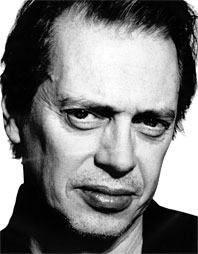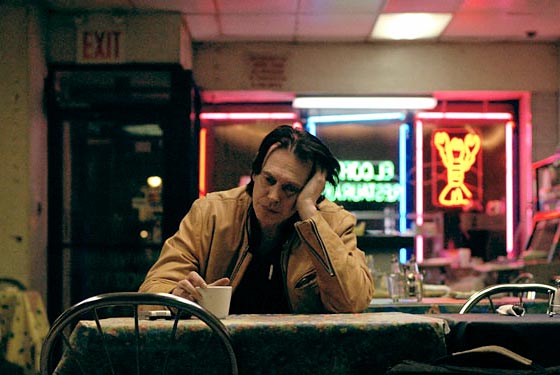
In Hollywood, Steve Buscemi is the comic you recruit to pepper your star vehicle with some jittery laughs; he’s the nervy villain in your action movie; the virtuoso weirdo in your Adam Sandler comedy; the guy standing next to Nicolas Cage. But at the Sundance Film Festival, which kicks off January 18, Buscemi is an indie god among video-store clerks: patron saint of character actors, working stiffs, and last-true-believers everywhere. In L.A., the paparazzi might miss him, but in Sundance, they hound him—and this year, he knows how they feel.
In Tom DiCillo’s new film, Delirious—one of two movies Buscemi is premiering at Sundance—the Brooklynite crosses the red carpet to play a paparazzo. A lonely, neurotic mess of a man, he trails celebrities through Manhattan with a long-range lens and picks up a homeless kid (Michael Pitt), teaching him to pluck free food from junket buffets while exploiting him for free work. When Pitt’s character catches the eye of a starlet and becomes her scruffy boy toy, the photographer loses his only friend and faces some sticky moral dilemmas. Buscemi swears he’s not trashing paparazzi but empathizing with them. To prepare, he even became an undercover shutterbug for a night, sort of.
“I learned how to hold a camera and which lenses to use,” he says, reclining on a leather sofa in a black cardigan in a Village photo studio. “Then I went out.” His first assignment was a gig any former fireman would love: the Victoria’s Secret Fashion Show. “I ended up putting on this really stupid disguise: this bad wig and a beret. I put a pillow in my shirt. I stuffed tissues in my mouth.” So a fat, jowly, vaguely French Steve Buscemi slung a camera around his neck and began stalking lingerie models. First, a real paparazzo tour guide took him into the big tent. “And as soon as we stepped inside, I heard somebody go, ‘Does that look like Buscemi? What’s he’s doing here?’ ” he says, shaking his head. The actor had better luck getting into the role outside, where he breathed in the boredom of his brethren. “I got a little window into how early they have to get there, how long they have to wait. So I understand that if a celebrity comes waltzing through and doesn’t stop, you can be like, ‘What the fuck?! Come on—I’ve been waitin’ here … ’ ”
Buscemi’s debut Sundance film, 1986’s Parting Glances, earned the young actor respect—it was one of cinema’s first portrayals of aids, and perhaps the festival’s first film with a serious gay theme. But the former Soho firefighter didn’t make the trek to Utah until 1992, when he arrived with a little film called Reservoir Dogs and Alexandre Rockwell’s In the Soup, which won the Grand Jury Prize. In the years since, Buscemi has aided and abetted some of indie cinema’s biggest break-ins—from the Coen brothers to Robert Rodriguez. Now almost 50, he admits that he can’t walk through Park City without writers “following me around with their script, saying, ‘Can you do this?’ ”
This year, Buscemi is also traveling with Interview, the fourth film he’s directed. In this remake of a tight, two-character film by the controversial Dutch director Theo van Gogh (murdered by an Islamist extremist in 2004), Buscemi plays a political columnist who gets into a tense psychosexual chess match when he’s forced to interview a seemingly frivolous movie star, Sienna Miller (not playing herself). Yes, both films “deal with the nature of celebrity,” but Buscemi says that’s not really what interested him. “I think both guys are looking for a connection with people but have self-destructive streaks that ultimately jeopardize whatever connections they’ve made.”
A fat, jowly, vaguely French Steve Buscemi began stalking lingerie models.
DiCillo says that Buscemi originally rejected the Delirious role because an early version of the script had made his character unredeemable—which probably indicates how hard Buscemi has fought over the years to humanize his cast of freaks and geeks. DiCillo, promoting a bit, adds that Buscemi “might also have been a little afraid of it, because it’s a huge part that enables him to bring out that emotional undercurrent that’s in all of his parts. You know how good he is at skating in and out of a film, being angry or funny, but here he is the entire soul of this film.”
You can see why writers bearing scripts would have no problems waylaying Buscemi in the snow. He’s a nice guy, a pre-Heath-and-Michelle, anti-Ratner, pro-firehouses kind of Brooklynite, relaxed and realistic. With two decades behind him, Buscemi has down-to-earth expectations for this year’s Sundance, especially after his film Lonesome Jim was nominated for a Grand Jury Prize last year but failed to find a wide audience at lower altitudes. “Sundance is about the new; it’s about people that are coming up,” he says. And so he’s decided to treat the whole thing almost as a family vacation. He’s packed a snowboard and he’s flying his wife and son in from Park Slope. Lucian, a 15-year-old rocker in a band called Fiasco, is just as excited to see The Future Is Unwritten, Julien Temple’s documentary about Joe Strummer of the Clash, as he is to see his dad’s movies. Buscemi, who worked with Strummer on Mystery Train, gave an interview for the film, and “while I was doing it, Julien asked my son’s band to get their guitars. We were shooting by the Brooklyn Bridge with this bonfire and musicians playing. I don’t know how much they’re in it, but I’m gonna bring the whole band for the party.”

Buscemi at Sundance: An Abbreviated Guide
Parting Glances,1986
The Brooklyn-born Lee Strasberg student makes good as an HIV-positive East Village punk.
Reservoir Dogs, 1992
Buscemi plays Mr. Pink, a role Quentin Tarantino originally wrote for himself.
In the Soup, 1992
Though Seymour Cassel wins the festival’s best-actor prize, Buscemi breaks out, playing an obsessive screenwriter who gets gangsters to fund his unproducible 800-page script. The film wins the Grand Jury Prize.
Desperado, 1995
In Robert Rodriguez’s action flick, Buscemi is a nattering nut job named “Buscemi.”
Living in Oblivion, 1995
Anticipating Project Greenlight, Buscemi plays an unhinged director.
Animal Factory,2000
Buscemi’s directorial follow-up to Trees Lounge stars Edward Furlong as a middle-class drug dealer.
Art School Confidential, 2005
Buscemi plays art poseur Broadway Bob.
Symbiopsychotaxiplasm: Take Two, 2005
Buscemi was mesmerized by the first part of William Greaves’s wild art film when it screened at Sundance in 1992. Buscemi befriended Greaves and served as a cameraman on part two. “I had the most fun,” he says, “climbing trees in Central Park to get shots.”
Lonesome Jim, 2006
Buscemi’s third directorial feature is nominated for the Grand Jury Prize but not picked up until later, by IFC. “I was disappointed that we didn’t get distribution during the fest, but we had four great screenings and I did a Q&A after every one. It was great to watch the film with an audience, the biggest audience we’d have.”